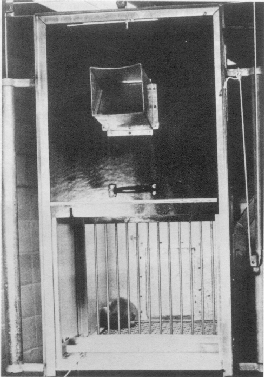Pit of despair
== Pit of Despair ==
The Pit of Despair was a controversial scientific experiment conducted by American psychologist Harry Harlow in the 1970s. The experiment was designed to study the effects of social isolation on rhesus macaques and has been widely criticized for its ethical implications.
Background[edit | edit source]
Harry Harlow was a prominent psychologist known for his research on maternal deprivation and social isolation in primates. His earlier experiments, such as the wire mother experiment, demonstrated the importance of maternal bonding in the development of infant monkeys. Building on this work, Harlow sought to understand the impact of prolonged social isolation.
The Experiment[edit | edit source]
The Pit of Despair involved placing infant rhesus macaques in a vertical chamber, often referred to as the "well of despair," for extended periods. The chamber was designed to prevent the monkeys from climbing out, effectively isolating them from any social interaction. The duration of isolation varied, with some monkeys being kept in the chamber for weeks or even months.
Findings[edit | edit source]
The results of the experiment were devastating. The isolated monkeys exhibited severe psychological distress, including depression, anxiety, and self-harm. Many of the monkeys were unable to reintegrate into social groups after their release from the chamber, displaying long-term behavioral abnormalities.
Ethical Controversy[edit | edit source]
The Pit of Despair experiment has been widely condemned for its ethical implications. Critics argue that the experiment caused unnecessary suffering to the animals and violated principles of animal welfare. The controversy surrounding the experiment contributed to the development of stricter ethical guidelines for research involving animals.
Legacy[edit | edit source]
Despite the ethical issues, the Pit of Despair experiment had a significant impact on the field of psychology. It highlighted the profound effects of social isolation and contributed to a greater understanding of mental health disorders such as depression and anxiety. The experiment also played a role in the establishment of more rigorous ethical standards for animal research.
See Also[edit | edit source]
- Harry Harlow
- Maternal deprivation
- Social isolation
- Wire mother experiment
- Animal welfare
- Ethical guidelines
References[edit | edit source]
This article is a psychology-related stub. You can help WikiMD by expanding it!
Search WikiMD
Ad.Tired of being Overweight? Try W8MD's physician weight loss program.
Semaglutide (Ozempic / Wegovy and Tirzepatide (Mounjaro / Zepbound) available.
Advertise on WikiMD
|
WikiMD's Wellness Encyclopedia |
| Let Food Be Thy Medicine Medicine Thy Food - Hippocrates |
Translate this page: - East Asian
中文,
日本,
한국어,
South Asian
हिन्दी,
தமிழ்,
తెలుగు,
Urdu,
ಕನ್ನಡ,
Southeast Asian
Indonesian,
Vietnamese,
Thai,
မြန်မာဘာသာ,
বাংলা
European
español,
Deutsch,
français,
Greek,
português do Brasil,
polski,
română,
русский,
Nederlands,
norsk,
svenska,
suomi,
Italian
Middle Eastern & African
عربى,
Turkish,
Persian,
Hebrew,
Afrikaans,
isiZulu,
Kiswahili,
Other
Bulgarian,
Hungarian,
Czech,
Swedish,
മലയാളം,
मराठी,
ਪੰਜਾਬੀ,
ગુજરાતી,
Portuguese,
Ukrainian
Medical Disclaimer: WikiMD is not a substitute for professional medical advice. The information on WikiMD is provided as an information resource only, may be incorrect, outdated or misleading, and is not to be used or relied on for any diagnostic or treatment purposes. Please consult your health care provider before making any healthcare decisions or for guidance about a specific medical condition. WikiMD expressly disclaims responsibility, and shall have no liability, for any damages, loss, injury, or liability whatsoever suffered as a result of your reliance on the information contained in this site. By visiting this site you agree to the foregoing terms and conditions, which may from time to time be changed or supplemented by WikiMD. If you do not agree to the foregoing terms and conditions, you should not enter or use this site. See full disclaimer.
Credits:Most images are courtesy of Wikimedia commons, and templates, categories Wikipedia, licensed under CC BY SA or similar.
Contributors: Prab R. Tumpati, MD


